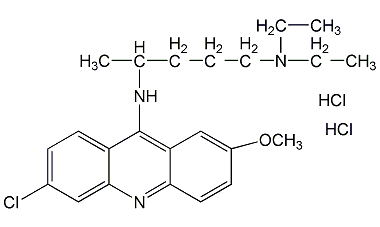Miparin dihydrochloride

Structural formula
| Business number | 01FH |
|---|---|
| Molecular formula | C23H32Cl3N3O |
| Molecular weight | 472.88 |
| label |
malaria flat, Quinacine dihydrochloride, malaria diping, Miparin hydrochloride, Adipine dihydrochloride, Quinacine dihydrochloride, Quinacrine |
Numbering system
CAS number:69-05-6
MDL number:MFCD00012659
EINECS number:200-700-8
RTECS number:AR7875000
BRN number:4834013
PubChem number:24278192
Physical property data
1. Characteristics: bright yellow Crystalline powder. Odorless. Bitter taste. Hygroscopic. Sensitive to light.
2. Density (g/mL,25/4 ℃): Undetermined
3. Relative vapor density ( g/mL,Air =1): Not OK
4. Melting point (ºC): 248~250℃ (decomposition)
5. Boiling point (ºC,Normal pressure): Not OK
6. Boiling point (ºC,5.2kPa): Not OK
7. Refractive index: Undetermined
8. Flashpoint (ºC): Undetermined
9. Specific optical rotation ( º): Undetermined
10. Spontaneous ignition point or ignition Combustion temperature (ºC) : Undetermined
11. Vapor pressure (kPa,25ºC): Not OK
12. Saturated vapor pressure (kPa,60ºC): Undetermined
13. Heat of combustion (KJ/mol): Not OK
14. Critical temperature (ºC): Undetermined
15. Critical pressure (KPa): Undetermined
16. Oil and water (octanol /Water) distribution coefficient The logarithmic value of : undetermined
17. Explosion upper limit (%,V/V): Undetermined
18. Lower explosion limit (%,V/V) : Undetermined
19. Solubility: 1gProduct dissolves in approx.35mlWater, more soluble In hot water, slightly soluble in ethanol and methanol, insoluble in ether, benzene and acetone. 1%Aqueous solutionpHapproximately4.5. Under ultraviolet light, the yellow aqueous solution can display bright fluorescence.
Toxicological data
None
Ecological data
None
Molecular structure data
None
Compute chemical data
1. Number of hydrogen bond donors:3
2. Hydrogen Bonding Number of receptors: 4
3. Rotatable Number of chemical bonds: 9
4. Interchange Number of isomers: 2
5. Topological molecules Polar surface area (TPSA):37.4
6. Heavy atoms Quantity: 30
7. Surface charge:0
8. Complexity :461
9. Isotope atomic number:0
10. Determine the number of atomic stereocenters:0
11. Uncertain number of atomic stereocenters:1
12. Determine the number of stereocenters of chemical bonds:0
13. Uncertain number of chemical bond stereocenters:0
14. Number of covalent bond units: 3
Properties and stability
None
Storage method
This product should be sealed, dry and protected from light.
Synthesis method
None
Purpose
Organic synthesis. Biochemical research. For microscope use. Pharmaceutical antimalarial and antiparasitic drugs.
extended-reading:https://www.bdmaee.net/polyurethane-catalyst-smp/extended-reading:https://www.bdmaee.net/acetic-acid-potassium-salt/extended-reading:https://www.bdmaee.net/u-cat-3513n-catalyst-cas135083-58-9-sanyo-japan/extended-reading:https://www.bdmaee.net/polycat-77-catalyst-cas3855-32-1-evonik-germany/extended-reading:https://www.newtopchem.com/archives/535extended-reading:https://www.bdmaee.net/wp-content/uploads/2022/08/DBU-octoate–SA102-Niax-A-577.pdfextended-reading:https://www.bdmaee.net/wp-content/uploads/2022/08/66.jpgextended-reading:https://www.newtopchem.com/archives/1824extended-reading:https://www.newtopchem.com/archives/40016extended-reading:https://www.newtopchem.com/archives/1148

